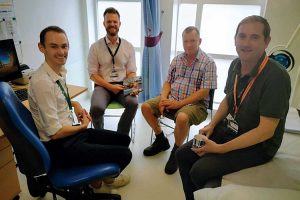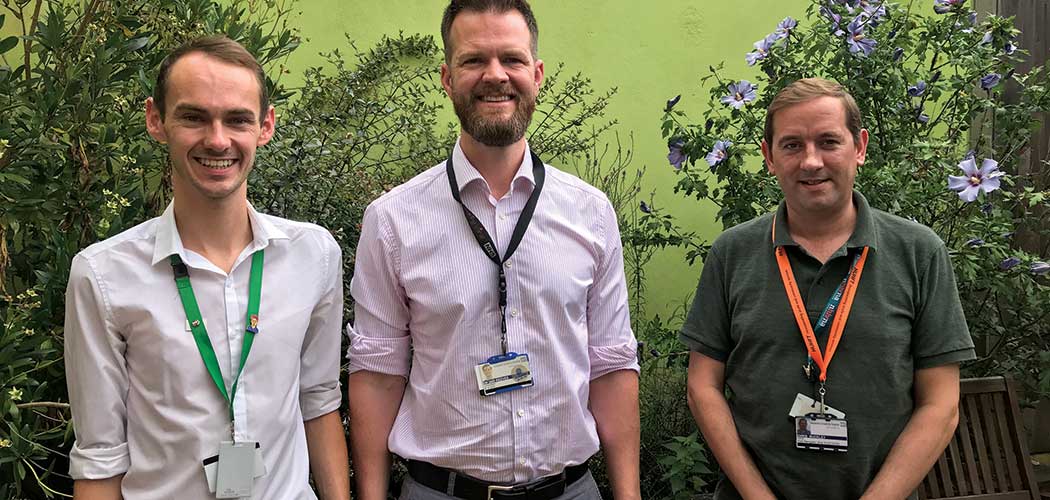Homerton Hospital in East London has been looking after people with HIV at the Jonathan Mann Clinic based in the Clifden Centre since it opened in 2013. The clinic is named after the leading US doctor who pioneered AIDS research in the 1980s. David Bridle spoke to the Homerton team of Dr Iain Reeves, Lead Consultant for HIV, Mike Spall-Hancy, Charge Nurse for HIV care and Chris Buckley who is HIV himself and is the HIV Peer Navigator.
There’s been a big decline in new diagnoses amongst gay men, have you seen that at the Homerton too?
Dr Iain: Yes we have. There’s been a decline in new diagnoses but I think we’re confident that is also a decline in new infections. So fewer people actually acquiring HIV.
What do you put that down to?
Dr Iain: I think that is broadly because people have been testing more frequently and because HIV clinics have been ready to start people on treatment very soon after diagnosis. We’ve been doing that here for a few years. Very shortly after diagnosis starting people on treatment, so they then achieve an undetectable viral load and therefore the HIV cannot be transmitted to other people. I think at the same time in the last few years obviously there’s been increasing use of PrEP.
Do you have a particular population of gay men you service here at the Homerton?
Dr Iain: Homerton traditionally is a place where it’s largely people that have migrated to the UK and in the past has largely been heterosexual people who often come from Africa. But I think following the kind of changes that have happened in the scene with the growth of Dalston and also with people moving into Dalston and Hackney, there’s been a bigger increase in the number of gay men that have used our clinics. I’d like to also think that we’ve become more gay-friendly over that period of time. So the majority of our new diagnoses are amongst gay men and equally we see a large number of gay men for PrEP and also for the general STI clinic.
I think the other thing that’s changed for us recently is that we’re seeing more people with recently acquired HIV infection. It seems a bit odd to say this but that’s probably a good thing because in the context of a smaller number of diagnoses, but a higher proportion of them being recent infection, that means that you’re diagnosing more people earlier.
So overall the number of people getting HIV is smaller and when you do diagnose them, you’re picking them up very early and so you’re able to intervene straight away.
Are those new diagnoses particular age groups?
Dr Iain: I think that younger gay men are not necessarily as well engaged in services and necessarily getting access to PrEP – or seeing themselves as people that might need PrEP. I also think that people that were not born in the UK are another particular kind of group where you see new diagnoses. So for us that would be gay men from Central and Eastern Europe and gay men from Latin America, in particular seem to be where we are seeing more HIV diagnoses.
And are they becoming infected in the UK?
Dr Iain: The vast majority, yes. People don’t necessarily realise they can just rock up to a sexual health clinic and can get access to all of these services without there being any kind of cost implication. I think also that people that come from other countries where there’s a lot more stigma around being gay, stigma is a barrier to getting access to healthcare. And so if you’re ashamed about being gay, I think that could be something that triggers people to try to sort of self-treat, to make themselves feel better about themselves. That can be short-term stuff like going out and having loads of sex, and taking loads of drugs, to deal with the shame about being gay. But also it means that you’re less likely to come to see somebody to talk about your sex life because you feel ashamed about it.
What’s your experience on the front line in relationship to stigma?
Mike: Sadly even in 2019, stigma is a real barrier to effective HIV care. There’s different types of stigma and different ways stigma can affect people. One thing that we always worry about is self-stigma – touching on from what Iain was discussing, ashamed of being gay as well as ashamed of having HIV. That may sound like something that could be easily worked with or easily managed but sometimes it’s really not – and then that can cascade down to someone maybe not taking their medication, not attending clinic and having complications with their mental health.
Other problems with stigma is sadly there are other health care professionals who may not work within HIV that have limited experience or understanding. The terminology they use may not be so relevant or they may have some ideas about transmission of HIV that are actually wrong; so we feel a duty that we really need to challenge that and educate.
How does stigma appear when people come and see you?
Mike: So we commonly have conversations with people who are talking about sex and relationships and they say: “No one will talk to me because I’m HIV-positive” or “I don’t feel comfortable telling people that I have HIV”. We say to them if you’re on effective treatment and you have an undetectable viral load there is no risk of onward transmission of HIV.
We’re also very interested in understanding these attitudes and behaviours that may be evident in some parts of the gay community to why there is stigma towards people living with HIV, and we try our best to educate. People living with HIV have a good prognosis, a normal life expectancy, almost the same as somebody who’s not living with HIV.
Dr Iain: One of the good things about some of the apps is that it allows people to connect with others in a way that’s really easy and it allows people to perhaps be less socially isolated, in some ways. But equally if you’re not out and you don’t want to be out, you can then use that to find partners without going to somewhere like a gay bar or club. And that means they are in the area where they may be more likely to have more anonymous sex partners and less likely to be able to actually see some of the information that might be for example in your magazine about sexual health services. So I think apps are a bit of a double-edged sword.

How long have you had HIV, Chris?
Chris: I was diagnosed 14 years ago.
What’s your job?
Chris: I see people when they’ve first been diagnosed but also I see people that have been diagnosed for a long time. And essentially we try to normalise HIV. I think if someone is faced with someone else that’s living very well with HIV, it kind of gives them a role model in a way. I basically tell my story and how I’ve managed to come to terms with HIV, and live very well with HIV.
Mike: One thing that we do see in clinic is this element of guilt of having HIV. They feel they acquired HIV because they’ve done something wrong. I feel that’s hugely stigmatising within itself and trying to alleviate that guilt and support people to say you have a chronic medical condition, but this is not something you should feel guilty about. And sadly when people have stigma in their mind, their behaviour can be self-destructive. We see a lot of people who have lived with HIV for many years who still have a lot of personal issues with their diagnosis and personal stigma.
Dr Iain: Nobody is over the moon about the fact they’ve acquired HIV – and obviously it is something that requires treatment – but I think you see some gay men who have accepted the diagnosis and are very keen to start on treatment. They know other people who are on treatment; they’ve been able to talk to other people about it sometimes before they’ve even seen us. I think that’s a big change in comparison to the way things used to be when people would not discuss it with anyone. There is much more knowledge about the effect of U=U (Undetectable = Untransmittable) and all the rest of it. So I think there is a greater understanding about the reality of HIV even if it isn’t necessarily wholly widespread in the gay community. On the other hand we do still see gay men who report that they’ve been rejected by people because they’ve disclosed their HIV status and that can be very upsetting for that person.
Can we talk about the gay men who are HIV and don’t know it – estimated to be around a 1000 gay men in London – and who haven’t tested. Why is this the case?
Chris: I think which communities people come from has a huge effect. We see a lot of people in Homerton from the Muslim community where it’s certainly very difficult to be out as gay, and even walking into a sexual health clinic could identify them as gay.
Mike: I think the fear of the result is sometimes a barrier to people getting tests. There’s maybe a young gay guy who’s been having lots of unprotected sex, you know ignorance is bliss in a way, and if you don’t have the test, you don’t know, it can’t affect your life in that moment.
Dr Iain: I think there’s a mixture of different reasons: for one thing it’s about knowing to test regularly enough. You’ll see that somebody has had an HIV test like a couple of years ago, but it hasn’t occurred to them that they might need to actually test regularly. For gay men that are having anal sex without a condom who have had more than one partner in the last three months, you should test every three months.
And you get a large number of gay men from the black and ethnic minority communities at Homerton?
Mike: I think people from black or ethnic backgrounds may not be as willing to test as people who are white because of maybe stigma, different experiences of testing or in some communities there may be high levels of religion that may create a barrier to access to sexual health services or testing as well.
Dr Iain: I certainly see African men who have been pressurised to get married and have families because that is the most important thing. They wouldn’t necessarily even think about themselves as being gay even though they may also be having sex with men.
For full details of the HIV services at the Jonathan Mann Clinic based in the Clifden Centre go to homerton.nhs.uk/jmc














